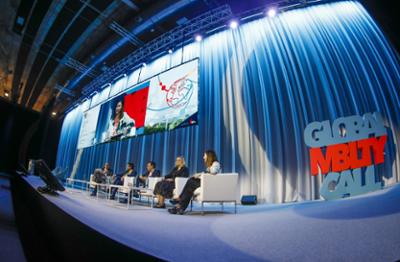

Global Mobility Call launches its first GMC Sustainable Mobility Report 2023

The event, organised by IFEMA MADRID and Smobhub and which will hold its third edition from 19 to 21 November, takes another step forward in its efforts to share all the advances being made in the different industrial sectors in the current process of transforming the mobility of people and goods. Issue 1 of the Global Mobility Call Papers brings together all the knowledge, discussions and experiences presented at the last edition of GMC 2023, and reflects the commitment of companies, administrations, regulators and innovation centres to society and to moving towards sustainable mobility models through public-private collaboration. This report stems from the commitment that Global Mobility Call aims to establish with society through a call to action (CALL), identifying the most relevant issues and tangible solutions to build a mobility which is more sustainable, efficient, equitable and safer.
Global Mobility Call presents the Sustainable Mobility Report 2023. A document that seeks to drive the adoption of tangible solutions to build a mobility which is more sustainable, efficient, equitable and safer, addressing the critical challenges facing the sector globally, and highlighting the importance of public-private partnerships.
A report that we hope will become an essential guide for the sector to better understand sustainable mobility and inspire new opportunities for innovation, collaboration and business, as a resource for experts and practitioners to learn from in order to better understand sustainable mobility and its implications.
This event, organised by IFEMA MADRID and Smobhub, takes another step forward in its aim of providing information with this first edition. The paper brings together the key points reflected in the more than 120 round tables held at the last edition of Global Mobility Call, as well as the contributions of more than 450 business and institutional leaders representing the 15 sectors that make up the mobility ecosystem, highlighting all the reflections and debates on the challenges and opportunities of mobility in a global context. Thus, this document can be defined as a repository of collective intelligence, proposing solutions that respond to the demands and needs of today's society.
To prepare this report Smobhub and IFEMA MADRID have worked together with the valuable collaboration of two institutions of the highest international prestige: the Fraunhofer Institute, the largest applied research organisation in Europe, based in Munich, and Bable, a spin-off of Fraunhofer and one of the key hubs in Europe for smart cities and mobility.
Infrastructure, investment and collaboration as the backbone of mobility
Global Mobility Call has established itself as a mobilising event, with the capacity to unite all sectors around shared aims where the citizen and mobility are at the centre of all proposals. Thus, throughout the report, crucial aspects that should guide the development of mobility are highlighted, such as investment in critical infrastructure, the structuring role of public transport and public-private collaboration, as well as the need to align the aims of all actors and to transform strategic planning into reality.
Global Mobility Call: A call to action
Thus, through this work, the critical importance of the updated public transport systems that are being implemented today in cities and territories is highlighted, as is the importance of public-private partnerships which combine public sector support and investment capacity in policies and infrastructure with private sector innovation. This union accelerates the adoption of sustainable practices and reaffirms the event's focus on mobilising the mobility ecosystem to move towards concrete results.
Key priorities for mobility leaders and communities are to foster partnerships between government and industry in order to implement sustainable infrastructure such as electric vehicle charging stations, bicycle-friendly cities under the 15-minute concept and pedestrian zones, with an emphasis on smart traffic management and digital solutions. Likewise, another of the key topics reflected in this report is the importance of making advances in technology and smart mobility solutions. This will enable the promotion of technologies such as AI-powered systems, 5G networks and new modes of transport, such as vertical take-off and landing vehicles (VTOL) and hyperloops that will enable the implementation of practical solutions such as gas emission reduction or real-time data sharing to improve the efficiency of public transport.
This must be supported by a clear regulatory framework where sustainable urban planning is in place to implement dynamic policies and incentive programmes that promote sustainable mobility, integrating mobility solutions to balance rural and urban needs. Zero-emission zones must be established to reduce congestion and create platforms that integrate different transport services, optimising planning and operation through advanced analytics and encouraging the use of car sharing and alternative transit options, prioritising shared mobility models.
Also, as a result of this report, it is noted that strengthening research and development in sustainable technologies, in agreement with all the sectors involved should be a key focus. This enables best practices to be shared and accelerates the adoption of environmentally responsible solutions, promoting models of research, innovation and global collaboration that allow the promotion of innovative and environmentally friendly solutions to be accelerated.
Making progress with the energy transition, another key topic
Progress in sustainable transport and mobility must promote the use of green energies, such as green hydrogen, biofuels or electric mobility, as well as address the challenges of automation in new modes of transport, which lead to the evolution of traditional ones. It is equally important to share and implement knowledge, policies and practices on an international level to address mobility challenges in a unified way and build a culture of continuous innovation across sectors.
Once all these ideas are put forward, the focus should be on putting the citizen at the centre of sustainable mobility. This should be done with participatory and accessible models that improve the quality of life and prioritise public transport as the basis for inclusive mobility.
Global Mobility Call would like to thank all its partners, exhibitors, speakers, institutions, associations and international organisations that have contributed to the development of this event and the report. In particular, the Ministry of Transport and Sustainable Mobility (MITMS), the Community of Madrid and the Madrid City Council, whose support has been essential to strengthen the position of Global Mobility Call as a leading event in the field of sustainable mobility.
Read the GMC Sustainable Mobility Report here.
The executive summary of the GMC 2023 Main Findings Report is attached to this press release.





